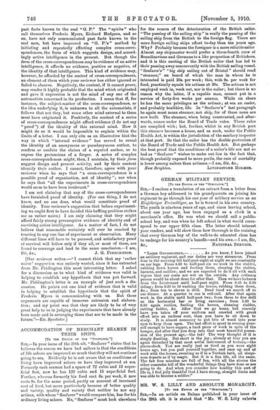ACCOMMODATION OF MERCHANT SEAMEN IN THEIR SHIPS.
[TO THE EDITOR OF THE "SPECTATOR."]
SIR,—In your issue of the 29th ult. " Seafarer " states that be believes the reason we have bad sailors is that the conditions of life ashore are improved so much that they will not continue going to sea. Evidently he is not aware that as conditions of living have improved ashore so have they improved at sea. Formerly each seaman had a space of 72 cubic and 12 super- ficial feet, now he has 120 cubic and 15 superficial feet. Further, whereas formerly his food cost 6s. per week, it now costs 9s. for the same period, partly on account of increased cost of food, but more particularly because of better quality and variety, quality and variety that neither he nor any artisan, with whom" Seafarer" would compare him, has for his ordinary living ashore. No, " Seafarer " must look elsewhere
for the reason of the deterioration of the British sailor. "The passing of the sailing ship" is really the passing of the sailing ship from the British to the foreign lag. There are more foreign sailing ships afloat to-day than ten years ago. Why P Probably because the foreigner is a more reliable sailor. Almost any shipmaster would prefer a three-fourth crew ol Scandinavians and Germans to a like proportion of Britishers, and it is this ousting of the British sailor that has led to their passing away concurrently with the British sailing vessel. "Seafarer's" "big ship sailing out of Bristol" should read "steamer," on board of which the man in whom he is interested is paid 20s. per week ; this, with 9s. per week for food, practically equals his artisan at 30s. The artisan is not employed week in, week out, nor is the sailor; but there is no reason why the latter, if a capable man, cannot put in a service of forty-five weeks per annum. While on shore he has the same privileges as the artisan ; at sea an easier, and probably healthier, life. In " Seafarer's " last paragraph he again must mean steamer, not ship, for of these none are now built. The steamer, when being constructed, and after- wards, comes under the Board of Trade rules. These rules are complied with ; but, further, whilst in any British port this steamer becomes a house, and as such, under the Public Health Act, is within the jurisdiction of the sanitary inspector at that port. . So that the sailor has the doable protection of the Board of Trade and the Public Health Act. But perhaps the best proof that the conditions of a sailor's life are not so bad as " Seafarer " wishes to make out lies in the fact that, though probably exposed to more perils, the rate of mortality is lower among sailors than artisans.—I am, Sir, ite.,


































































 Previous page
Previous page